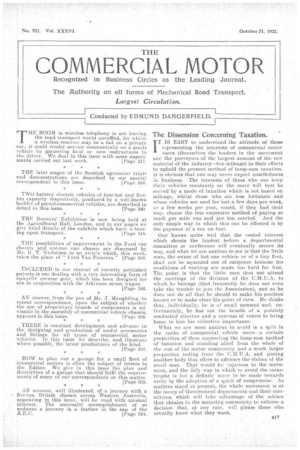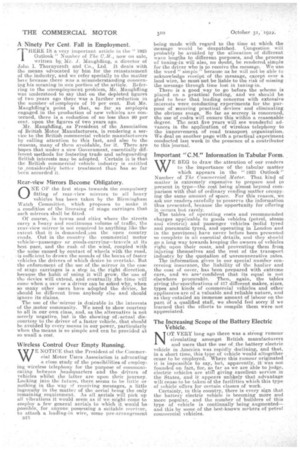The Dissension Concerning Taxation. • '
Page 1

Page 2

If you've noticed an error in this article please click here to report it so we can fix it.
IT IS EASY to understand the attitude of those representing the interests of commercial motor users (themselves the leaders in the movement an the purveyors of the largest amount of the raw material of the industry—ton-mileage) in their efforts to uphold the present method of lump-sum taxation. it is obvious that one may never ex_.pect unselfishness in business. The interests of those who can keep their vehicles constantly on the move will best be served by a mode of taxation which is not based on mileage, whilst those who are less fortunate and whose vehicles are used for but a few days per week, or a few weeks per year, would, if they had their way, choose the less expensive method of paying so much per mile run and per ton carried. And the onlysimple way in which this can be effected is by the payment of a tax on fuel.
One knows quite well that the vested interest which shouts the loudest before a departmental committee or conference will eventually secure its way, and what we are anxious to see is that the little man, the owner of but one vehicle or of a tiny fleet, shall riot be squeezed out of exigence bec-ause his conditions of working are made too hard for him: The point is that the little man does not attend the meetings of the division of the C.M.U.A. to which he belongs (that frequently he does not even. take the trouble to join the Assodiation), and so he does not do all that he should to make his position known or to make clear his point of view. He thinks that, individually, he. is of small moment and, unfortunately, he has not the benefit of a publicly conducted election and a canvass of voters to bring home to him his collective importance.
What we are most anxious to avoid is a split in the ranks of commercial vehicle users—a certain proportion of them supporting the lump-sum method of taxation and standing aloof from the whole of the rest of the motor community and a much larger proportion ceding from the C.M.U.A. and joining another body that offers to advance the claims of the small man. That would be injurious to the movement, and the o–nly way in which to avoid the catastrophe is for a definite''move, to be made towards unity by the adoption of a spirit of compromise. As matters stand at present, the whole movernent is at the mercy of Government departments and their committees, which will take advantage of theschism' that obtains in the motoring community to enforce a decision that, at any rate, will please those who actually knew what they want. ANinety Per Cent. Fall in Employment.
THERB IS a very important article in the " 1923 Outlook " Number of The CAL, now on sale, written by, Mr. J. Maughtling, a director of John L Thornycroft and Co., Ltd. It deals with the means advocated by him for the reinstatement of the industry, and we refer specially to the matter here because there was a Misunderstanding concerning his meaning in one portion of the article. Referring to the unemployment problem, Mr. Matighfling was understood to say that on the depleted figures of two -years ago there was a further reduction in the number. of eemployea of 10 per cent. But Mr.
Maughflin i g's point s that, so far as employes engaged in the production of new vehicles are concerned, there is a reduction of no less than 90 per cent. upon the figures of two years ago. Mr. Maughlling, as President of the Association of British Motor Manufacturers, is rendering a service to the British commercial vehicle manufacturers by calling attention to this fact, and also to the reasons, many of them avoidable, for lt. There are hopes that under a new Government, essentially different methods for fostering trade and safeguarding .British interests may be adopted. Certain it is that the British commercial vehicle industry is entitled to considerably better treatment than has so far bee accorded it.
Rear-view Mirrors Become Obligatory.
0 NE OF the iirst steps towards the compulsory fitting of rear-view mirrors to all heavy vehicles has been taken by the Birmingham Watch Committee, which proposes to make it .a condition of the licensing of stage carriages that
such mirrors shall be fitted. .
Of course,. in towns and cities where the streets carry a heavy and continuous volume of traffic,the rear-view mirror is not required to anything like the extent that it is demanded ,on the open country roads. Out in the country the commercial motor vehicle—passenger or goods-carrying—travels at its best pace, and the rush of •the wind, coupled with the noise caused by contact of wheels with the road, is sufficient to drown the sounds of the horns of faster vehicles the drivers of which desire to overtake. But the enforcement of the use of the mirror in the ease of stage caraiages is . a step ha the right direction, because the habit of using it will grow, the use of the device will extend, and eventually the time will come when a ussr-ne a driver can be asked why, when so many other users have adopted the device, he should be different from anybody else and should -ignore its claims.
The use of the:mirror is desirable in the interests of the motor community. We need to show courtesy to all in our own class, and, as the alternative is not merely 'negative, but is the showing • of actual discourtesy to the driver of a faster vehicle, that should be avoided by every means in our power, particularly when the means is so simple and can be_ provided at so small a cost.
Wireless Control Over Empty Running.
WE NOTICE that the President of the Commercial Motor Users Association is advocating a close study of the possibilities of employing wireless telephony for the purpose of e0r11MUTlieating between headquarters and the drivers of vehicles whilst the latter are upon their journey. Looking into the future, there seems to be little or nothing in the way of receiving messages, a little ingenuity in the matter of the aerial being the only remaining requirement. As all aerials will pick up all vibrations it would seem as if we might come to employ a few general aerials to -which it would be possible, for anyone possessing a suitable receiver, to attach .a leading-in wire, some pre-arrangement
niS
being made with regard to the time at which the message" would be despatched. Congestion will probably be avoided by the allocation of different wave lengths to different purposes, and the process of tuning-in will also, no doubt, be rendered; simple foe the driver who is to receive the message. We use the word " simple " because as he will not be able to acknowledge receipt of the message, except over a land wire, he must not be liable to the risk of missing the message through time lost in tuning-in. There is a good way to go before the scheme is placed on a practical footing, and we should be glad to hear that leading concerns with extensive interests were conducting experiments for the purpose of securing practical devices • and eliminating the obvious snags. So far as secrecy is concerned, the use of codes will ensure this within a reasonable degree. The next five years will see wonderful advances in the application of wireless telephony to the improvement of road transport organization. We deal on another page with a practical experiment conducted last week it the presence of a contributor to this journal.
Important "C.n" Information in Tabular Form. WE BEG to draw the attention of our readers to the importance of the tabular matter which appears in the "1923 Outlook" Number of The Comm.ercial Motor. That kind of matter is extremely expensive to prepare and to -present in type—the cost being almost beyond comparison with that of ordinary reading matter occupying the same amount of space. For this reason, we ask our readers carefully to preserve the information thus presented, because the opportunity for offering it occurs but rarely.
The tables of operating costs and recommended charges applicable to goods vehicles (petrol, steam and electric) and passenger vehicles (solid tyred nd pneumatic tyred, and operating in London and in the provinces) have never before been presented so complete in all essential details, and they should go a long way towards keeping the owners of vehicles right. upon their costs, and preventing them Imre injuring themselves and the rest of the transport industry by the quotation of unremunerative rates. The information given in our special number concerning insurance, the liability of the haulier and the costof cover, has been prepared with extreme care, and we are' confident that its equal is not elsewhere procurable. Then, again, the tables giving the? epecifications of 417 different makes, sizes, types and kinds of commercial vehiclet and other appliances are of a valuable and reliable nature, and as they entailed an immense amount of labour on the part of a qualified staff, we should feel sorry if we learned that the efforts to compile them were not appreciated.
The Increasing Scope of the Battery Electric Vehicle. NOT.VERY long ago there was a strong rumour circulating amongst British manufacturers and users that the use of_ the battery electric vehicle in America was rapidly declining, and that, in a short time, this type of vehicle would al toge-ther cease to be employed. Where this rumour originated it is impossible to say, but, apparently, it was not founded an fact, for, so far as we are able to judge, electric vehicles are still giving excellentservice in the States. and it appears unlikely that advantage will cease to be taken of the facilities which this type of vehicle offers for certain classes of work.
Certainly, i.n this country, there is every sign that the battery electric vehicle is becoming more and more popular, and the number of builders of this type of vehicle is continually being augmented— and this by some of the beet-known mekers of petrol commercial vehicles.


































